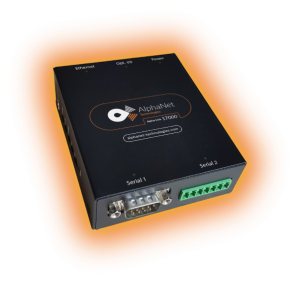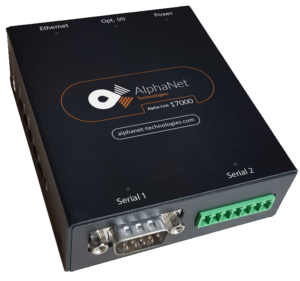In the rapidly evolving landscape of industrial automation and control, data is the lifeblood that drives decision-making, optimization, and efficiency. Collecting and storing data from various devices and sensors is essential for understanding processes, diagnosing issues, and improving overall operations. The AlphaNet AT17000-MMt Gateway Converter Series, equipped with logging memory, emerges as a powerful solution to streamline data collection and storage in your industrial network. In this article, we’ll explore the significance of data collection in industrial settings, the challenges it presents, and how the AT17000-MMt Gateway Converter Series simplifies the process.
The Importance of Data Collection in Industrial Networks
The Foundation of Informed Decisions
Data collection is the foundation of informed decision-making in industrial networks. Here’s why it’s crucial:
- Visibility: Data collection provides visibility into industrial processes, allowing operators and engineers to monitor the performance of equipment and systems in real time.
- Diagnosis: Collected data enables the diagnosis of issues and anomalies, facilitating proactive maintenance and reducing downtime.
- Optimization: Analyzing historical data helps identify areas for optimization, leading to improved efficiency, productivity, and cost savings.
- Compliance: In many industries, data collection is essential for regulatory compliance and reporting.
The Challenges of Data Collection
Navigating Data Complexity
While the benefits of data collection are evident, industrial networks face several challenges in implementing effective data collection strategies:
- Diverse Data Sources: Industrial networks often comprise diverse devices and sensors that produce data in various formats and communication protocols.
- Data Volume: The sheer volume of data generated in industrial settings can overwhelm traditional data collection methods, making it challenging to manage and analyze.
- Real-Time Demands: Industries increasingly require real-time data for timely decision-making, putting pressure on data collection systems to deliver data with minimal latency.
- Data Integrity: Ensuring the accuracy and integrity of collected data is crucial. Any errors or discrepancies can lead to incorrect decisions and costly consequences.
Strategies for Effective Data Collection
A Roadmap to Success
To overcome the challenges of data collection in industrial networks, several strategies and technologies are employed:
1. Data Logging
Data logging involves capturing data from various sources and storing it in a structured format. This allows for easy retrieval and analysis at a later time. Data loggers come in various forms, from hardware devices to software applications.
2. Real-Time Monitoring
Real-time monitoring systems continuously collect and display data as it’s generated, providing immediate insights into industrial processes. These systems are crucial for industries that require instantaneous decision-making.
3. Edge Computing
Edge computing, as part of the Industrial Internet of Things (IIoT), involves processing data at or near the source, reducing latency and enabling real-time analysis. Edge devices equipped with computing power facilitate local data processing and decision-making.
4. Secure Data Storage
Ensuring the security and integrity of collected data is paramount. Secure data storage solutions protect sensitive information from unauthorized access and cyber threats.
The Role of AlphaNet AT17000-MMt Gateway Converter Series
Simplifying Data Collection
The AlphaNet AT17000-MMt Gateway Converter Series plays a pivotal role in simplifying data collection within industrial networks. With its integrated logging memory, this series streamlines the process and offers the following advantages:
1. Data Logging Capabilities
The AT17000-MMt Gateway Converter Series is equipped with logging memory that allows you to collect and store data from various devices and sensors within your industrial network. It can capture data in real time, ensuring that you have access to historical data for analysis and decision-making.
2. Protocol Translation and Compatibility
One of the key strengths of the AT17000-MMt Gateway Converter Series is its ability to bridge the gap between different communication protocols. It can translate Modbus RTU/ASCII data to Modbus TCP and vice versa, ensuring compatibility with a wide range of devices.
3. Real-Time Data Access
In addition to data logging, the AT17000-MMt Gateway Converter Series provides real-time data access, allowing you to monitor industrial processes as they happen. This real-time capability enhances your ability to respond promptly to changing conditions and make informed decisions.
4. Secure Data Storage
Data security is a top priority in industrial networks. The AT17000-MMt Gateway Converter Series ensures the secure storage of collected data, protecting it from unauthorized access and cyber threats. This secure data storage is essential for compliance with industry regulations.
Conclusion: Empowering Data-Driven Decisions
The Future of Data Collection
Data collection is at the heart of data-driven decision-making in industrial networks. As industries continue to evolve and embrace technologies like the AlphaNet AT17000-MMt Gateway Converter Series, the future of data collection is set to become more efficient, secure, and accessible. By simplifying data collection and storage, industrial networks can unlock the power of data, gain valuable insights, and drive continuous improvement in their operations.
In conclusion, the AlphaNet AT17000-MMt Gateway Converter Series with logging memory is a game-changer in the realm of data collection for industrial networks. It empowers industries to harness the full potential of data for better decision-making, improved efficiency, and a competitive edge in today’s dynamic industrial landscape.


